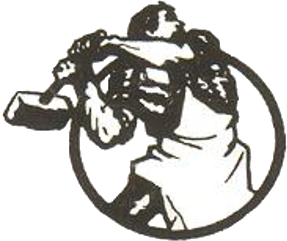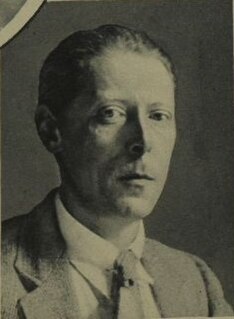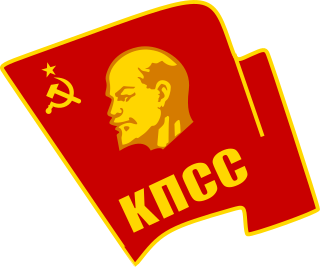
The Communist International (Comintern), known also as the Third International (1919–1943), was an international organization that advocated world communism. The Comintern resolved at its Second Congress to "struggle by all available means, including armed force, for the overthrow of the international bourgeoisie and the creation of an international Soviet republic as a transition stage to the complete abolition of the state". The Comintern had been preceded by the 1916 dissolution of the Second International.

The Communist Party was a Left Communist organisation established at an emergency conference held on 19–20 June 1920 at the International Socialist Club in London. It comprised about 600 people.

The Communist Workers' Party of Germany was an anti-parliamentarian and left communist party that was active in Germany during the time of the Weimar Republic. It was founded in April 1920 in Heidelberg as a split from the Communist Party of Germany (KPD). Originally the party remained a "sympathising member of Communist International." In 1922 the KAPD split into two factions, both of whom kept the name but are referred to as the KAPD Essen Faction and the KAPD Berlin Faction.

Albert Samuel Inkpin was a British communist and the first General Secretary of the Communist Party of Great Britain (CPGB). He served several terms in prison for political offences. In 1929 he was replaced as head of the CPGB and made head of the party's Friends of Soviet Russia organisation, a position he retained until his death.

Communist Party of Latvia was a political party in Latvia.

Jan Appel was a German revolutionary who participated in the German Revolution. He became a prominent Left Communist activist and theorist.

Abaninath Mukherji was an Indian revolutionary and co-founder of the Communist Party of India. His name was often spelt Abani Mukherjee.

The Congress of the Peoples of the East was a multinational conference held in September 1920 by the Communist International in Baku, Azerbaijan. The congress was attended by nearly 1,900 delegates from across Asia and Europe and marked a commitment by the Comintern to support revolutionary nationalist movements in the colonial "East" in addition to the traditional radical labor movement of Europe, North America, and Australasia. Although attended by delegates representing more than two dozen ethnic entities of the Middle and Far East, the Baku Congress was dominated by the lengthy speeches of leaders from the Russian Communist Party (RCP), including: Grigory Zinoviev, Karl Radek, Mikhail Pavlovich, and Anatoly Skachko. Non-RCP delegates delivering major reports included Hungarian revolutionary Béla Kun and Turkish feminist Naciye Hanim.
Socialist Workers Party was a political party in the British Mandate of Palestine from 1919–1922. Its followers were known as Mopsim.
The Yugoslav Communist Group was an organization of Yugoslav revolutionaries in Russia, who had adopted a communist ideology. The group was affiliated to the Federation of Foreign Groups of the Russian Communist Party (Bolsheviks). The organization began publishing the newspaper Revolucija in 1917.
The French Communist Group was a small organization of French residents in Russia, founded in Moscow in October 1918. One of the founders, Jacques Sadoul, had been a French infantry soldier in Russia during World War I but had joined the Red Army and became an organized communist.

The 2nd World Congress of the Comintern was a gathering of approximately 220 voting and non-voting representatives of Communist and revolutionary socialist political parties from around the world, held in Petrograd and Moscow from July 19 to August 7, 1920. The 2nd Congress is best remembered for formulating and implementing the 21 Conditions for membership in the Communist International.
The 1st Congress of the Comintern was an international gathering of communist, revolutionary socialist, and syndicalist delegates held in Moscow which established the Communist International (Comintern). The gathering, held from March 2 to 6, 1919, was attended by 51 representatives of more than two dozen countries from around Europe, North America, and Asia.

The All-Russian Congress of Soviets was the supreme governing body of the Russian Soviet Federative Socialist Republic from 1917 until 1936, effectively. The 1918 Constitution of the Russian SFSR mandated that Congress shall convene at least twice a year, with the duties of defining the principles of the Soviet Constitution and ratifying peace treaties. The October Revolution ousted the provisional government, making the Congress of Soviets the sole, and supreme governing body. It is important to note that this Congress was not the same as the Congress of Soviets of the Soviet Union which governed the whole Soviet Union after its creation in 1922.
The Fourth International (FI), founded in 1938, is a Trotskyist international. In 1963, following a ten-year schism, the majorities of the two public factions of the Fourth International, the International Secretariat and the International Committee, reunited, electing a United Secretariat of the Fourth International. In 2003, the United Secretariat was replaced by an Executive Bureau and an International Committee, although some other Trotskyists still refer to the organisation as the USFI or USec.

The Young Communist International was the parallel international youth organization affiliated with the Communist International (Comintern).
The 4th World Congress of the Communist International was an assembly of delegates to the Communist International held in Petrograd and Moscow, Soviet Russia, between November 5 and December 5, 1922. A total of 343 voting delegates from 58 countries were in attendance. The 4th World Congress is best remembered for having amplified the tactic of the United Front into a fundamental part of international Communist policy. The gathering also elected a new set of leaders to the Comintern's governing body, the Executive Committee of the Communist International (ECCI).

The Executive Committee of the Communist International, commonly known by its acronym, ECCI (Russian acronym ИККИ), was the governing authority of the Comintern between the World Congresses of that body. The ECCI was established by the Founding Congress of the Comintern in 1919 and was dissolved with the rest of the Comintern in May 1943.












